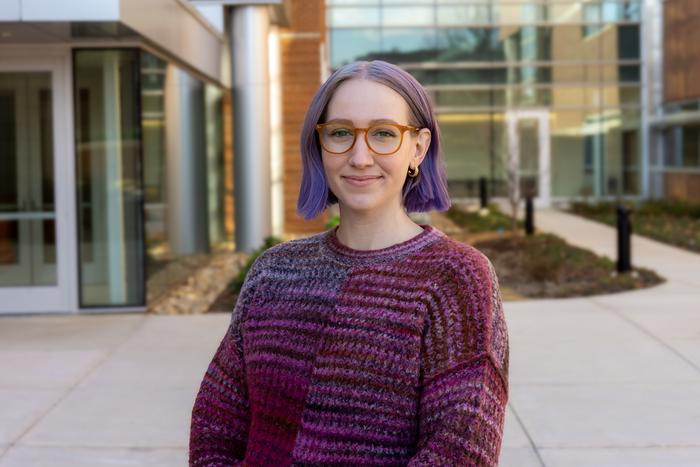Kelsey Coffman, an assistant professor in the Department of Entomology and Plant Pathology at the University of Tennessee, has garnered attention for her groundbreaking research in the field of entomology and viral interactions. Recently, she was awarded the prestigious 2024 Young Investigator Award from the open-access scientific journal Insects. This accolade not only serves as recognition of her exemplary contributions to entomology but also highlights the pivotal role of her research on insect-virus interactions in advancing scientific understanding in the field.
Coffman’s work focuses primarily on the intricate relationships between beneficial viruses and parasitoid wasps, which are known for their unique life cycles and roles in ecological systems. By employing sophisticated techniques in molecular biology, genetics, and bioinformatics, Coffman explores the ways that these viruses influence parasitoids and their host interactions. The profound implications of her research challenge conventional understandings of symbiotic relationships in nature and demonstrate how viruses can exert a beneficial influence on insect populations.
The significance of understanding insect-virus interactions cannot be overstated, especially in the context of biological control strategies. Coffman’s research delves into how these heritable viruses shape the biology and behavior of parasitoid wasps, which are instrumental in regulating pest populations. By understanding these dynamics, researchers can potentially develop novel biological control methods that are environmentally sustainable and reduce the reliance on synthetic pesticides.
Coffman earned her Ph.D. from the University of Georgia in 2020, where she initiated her exploration into the world of insect-virus interactions. Her transition to postdoctoral work at the USDA Agricultural Research Service allowed her to expand her research directions while living on the Big Island of Hawaiʻi, a hub of biodiversity and unique ecological interactions. During her time there from 2021 to 2023, she honed her skills in molecular techniques essential for her current studies.
Upon her appointment to the UTIA Department of Entomology and Plant Pathology in 2024, Coffman brought with her an impressive portfolio of research and an eagerness to contribute to the field’s understanding of intricate interactions at microscopic levels. She emphasizes the importance of recognizing the role that viruses play within these biological systems, which has often been underappreciated in entomological research.
Coffman stated, “I’m honored to receive this award and grateful for the recognition of my research on insect-virus interactions.” Her expression of gratitude reflects not only acknowledgment of her hard work but also a commitment to pushing the boundaries of current scientific knowledge. Through her findings, Coffman aims to foster a deeper comprehension of how viral entities interact with hosts, thereby enhancing overall ecosystem balance and functionality.
Highlighting the importance of academic dissemination, Coffman’s research is published in Insects, an international, peer-reviewed open-access journal that boasts a commitment to high-quality research across a wide array of entomological topics. This journal serves as a significant platform for sharing insights that can catalyze further research and innovation in biological control strategies relating to pest management.
As researchers like Coffman continue to unravel the complexities of insect biology, the implications for agricultural practices become increasingly relevant. The potential for employing parasitoid wasps as biological control agents could revolutionize pest management approaches, promoting more sustainable practices that align with modern environmental standards. Her research aligns seamlessly with the broader mission of the University of Tennessee Institute of Agriculture, which emphasizes teaching, research, and outreach.
The University of Tennessee Institute of Agriculture’s diverse components—such as the Herbert College of Agriculture, UT College of Veterinary Medicine, UT AgResearch, and UT Extension—create a fertile ground for interdisciplinary research and collaboration. This ecosystem not only impacts local communities in Tennessee but extends its benefits globally, addressing issues that resonate far beyond state lines.
Coffman’s path signifies a growing recognition of the importance of interdisciplinary approaches in solving complex biological questions. By integrating molecular biology with ecological and agricultural considerations, her research illuminates new pathways for understanding and managing pest populations through natural means. This shift underscored by her findings provides hope for a future where agriculture employs more symbiotic relationships rather than adversarial ones when managing pests.
As the field of entomology evolves with researchers like Coffman leading the charge, the potential to develop innovative solutions using naturally occurring biological processes becomes more apparent. Coffman’s work prompts an essential reevaluation of how scientists perceive and harness the interactions between insects and their viral counterparts, inviting further inquiry and discussion in both scientific and agricultural communities.
In summary, Kelsey Coffman stands at the forefront of a crucial area of research that not only furthers academic understanding but also holds the promise for real-world applications in agricultural pest management. Her recognition through the Young Investigator Award marks just the beginning of what is sure to be a prolific career dedicated to answering some of the most pressing questions facing entomology today.
Subject of Research: Insect-virus interactions, biological control
Article Title: Kelsey Coffman Receives 2024 Young Investigator Award for Groundbreaking Entomological Research
News Publication Date: October 2023
Web References: University of Tennessee Institute of Agriculture
References: Research articles published in Insects
Image Credits: Photo by T. Orange, courtesy UTIA.
Keywords: Kelsey Coffman, entomology, insect-virus interactions, parasitoid wasps, biological control, University of Tennessee, Young Investigator Award, research, molecular biology.




